
Over two weeks, critic Linda Holmes watched every Olympic discipline, from archery to wrestling. Above, Manon Brunet of Team France, left, competes against Olga Nikitina of Team ROC during the Women’s Sabre Team Fencing Gold Medal Match on day eight of the Tokyo 2020 Olympic Games. Ryan Pierse/Getty Images hide caption
toggle caption
Ryan Pierse/Getty Images
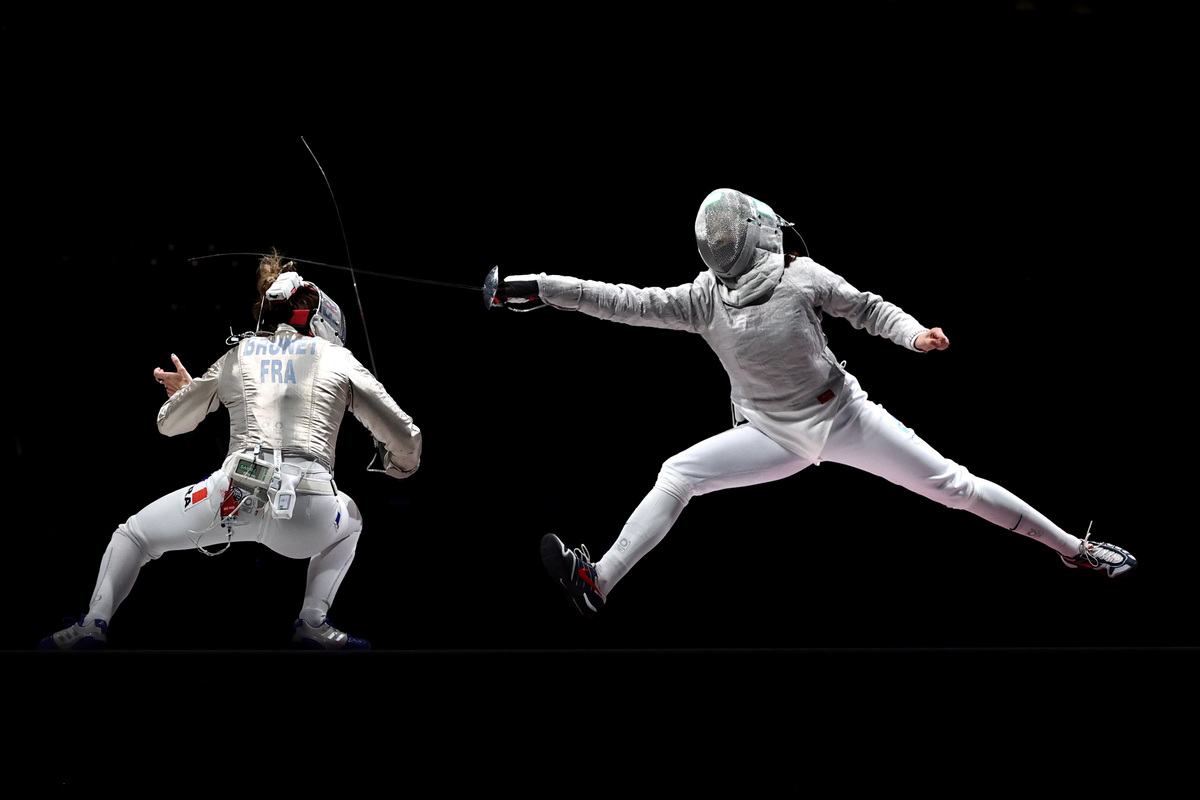
Over two weeks, critic Linda Holmes watched every Olympic discipline, from archery to wrestling. Above, Manon Brunet of Team France, left, competes against Olga Nikitina of Team ROC during the Women’s Sabre Team Fencing Gold Medal Match on day eight of the Tokyo 2020 Olympic Games.
Ryan Pierse/Getty Images
I don’t know how I got to be as old as I am without knowing that dressage horses danced to music. Don’t get me wrong: I knew dressage was fancy horses. I just didn’t know it was fancy horses who danced to an orchestral arrangement of Queen’s “Radio Ga-Ga.”
Coming into the Tokyo Games, I was conflicted and troubled, as a lot of people were, by a knot of injustices and safety concerns that made me wonder whether there was any way to really enjoy them at all. And so, I decided to treat them as a chance to visit a whole host of unfamiliar worlds in which people work harder than many of us can imagine to build toward a moment that, for many competitors, will only come once and will not result in any glory, or any real money, at all.
To my own surprise, I find two weeks later that being a completist for the first time by watching some of every sport made me a fan again. And stepping away from the prime-time coverage that highlights only a few sports and only a few athletes — with heavily produced stories that sometimes contextualize their hard work in oversimplified ways — made it possible to think differently about what makes a sport beautiful in the first place.
Of course, nothing improves the sports spectator experience like an obsession with arcane rules, so let me oblige. I watched more than every sport and less than every event; what I tried to do was catch every discipline. I also followed a Familiarity Rule, under which I made only symbolic visits to the Olympic sports that have the highest media exposure in the country where I live: baseball, basketball, boxing, tennis, and golf. If I’m going to sit down and spend time navigating the various viewing options needed to watch the Olympics, it’s not so I can watch golf. (Sorry not sorry, golf.)
But as to the rest, I watched as much as I could. Mostly athletes I had never heard of, mostly athletes who were not Team USA. And here’s the problem and the shocking discovery: Each of these sports is the best sport in the Olympics. Some are the most beautiful, some are the most surprising, some have the most tremendous life lessons lurking just under the surface, and some are simply stunning examples of people who do extraordinarily hard things almost unimaginably well. I cried at some, I smiled at most, and I learned a lot. So here they are, from Archery to Wrestling: all the best sports in the Olympics.
Archery
I admire archery as a person with an anxiety disorder, because the athletes (and this is true in all shooting-type events) have to lower their own heart rates to stay steady. And — get this — this year, most of the archers agreed to a system that estimates their heart rates for TV viewers at home. Lowering your heart rate is one thing; lowering your heart rate while everyone watches you try to lower your heart rate resembles not just an anxiety dream, but an anxiety dream about having anxiety.
Artistic swimming
This and rhythmic gymnastics are the two events people most freely make fun of at the Olympics — I’m sure it’s a coincidence that they’re also two of the three events that are only competed by women (the other is softball). But you’ll rarely see better visuals than the camera work that allows you to watch both what’s going on above the water, which is judged, and what’s going on underwater, which is generally not. What is above the water is beautiful and organized. What is beneath the water is effort, training, constant work, great strength. It’s a metaphor for … most things, actually.

An overview shows Team China competing in the team free routine artistic swimming event. I don’t know about any of you, but … I couldn’t do this. Oli Scarff/AFP via Getty Images hide caption
toggle caption
Oli Scarff/AFP via Getty Images
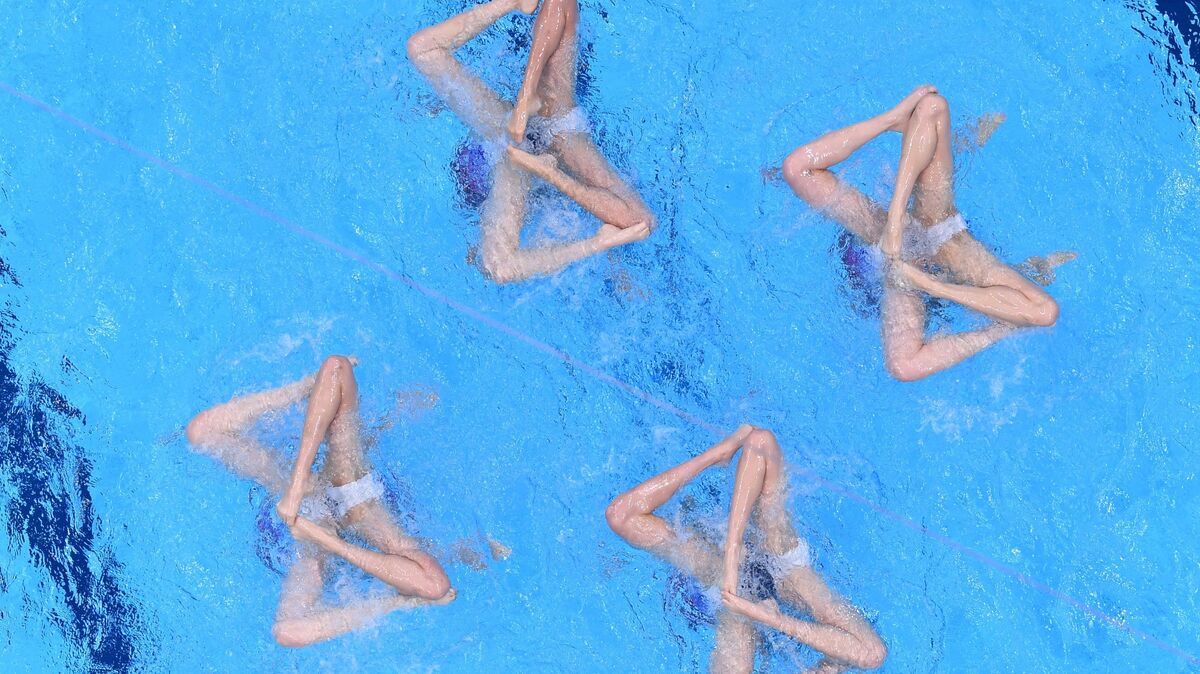
An overview shows Team China competing in the team free routine artistic swimming event. I don’t know about any of you, but … I couldn’t do this.
Oli Scarff/AFP via Getty Images
Badminton
Mary Carillo’s legendary riff aside, badminton is a beautiful demonstration of working fast and slow at the same time. The reaction times are extraordinarily short, but the birdie also floats maddeningly and almost pauses in the air. A tennis ball could never! They are speedy but patient in this sport, and we can all aspire to that.
3×3 basketball
I have watched a great lot of “regular” basketball in my life, but 3×3 is faster and makes two bold arguments about other basketball games: they have too many people, and there’s too much running up and down. I admire the willingness to challenge the dogma that says all team sports should involve running up and down, and I swear I do not only say that as a veteran of middle school gym class.
Beach volleyball
In beach volleyball, because you play in pairs, there’s nowhere to hide, but there is a person you can potentially disappoint. You cannot disappear into a team, and yet you are not competing alone, and honestly, what friendship could survive? These are the bravest warriors. I’m afraid to even cook dinner with another person.
Canoe/kayak
I love canoe and kayak slalom events, which take the athlete through not only downstream gates, but also upstream gates that require chaotic-looking (but expertly executed) paddling in the “wrong” direction. “Winning requires a certain amount of working upstream and just getting that part over with as soon as possible” is embarrassingly on the nose for a principle it’s impossible to argue with.
Cycling
I watched plenty of cycling but especially loved BMX this year, both racing and freestyle. Those two disciplines really drive home a fundamental question of Olympic competition: Would you rather be out there doing whatever you want, alone on a course? Or would you rather be in a frenetic, adrenaline-soaked race where one false move can send you rolling down a steep track, and the false move might not have even been made by you? Special honorable mention to the commentator who tried to explain the BMX move known as “the E.T.” by asking if we remember when E.T. went home and pedaled the bike. I believe that is not, in fact, how E.T. got home, but that guy gets an A in E.T. anyway. Honestly, why didn’t E.T. get home on the bike? That would have been a great movie.

Charlotte Worthington of Team Great Britain practices a trick prior to the BMX Freestyle final. Ezra Shaw/Getty Images hide caption
toggle caption
Ezra Shaw/Getty Images

Charlotte Worthington of Team Great Britain practices a trick prior to the BMX Freestyle final.
Ezra Shaw/Getty Images
Diving
I have a secret: Most elite dives look the same to me, unless they go very very wrong. I am only capable of telling good dives from bad ones by seeing how big the splash is. Thus, diving is an illustrative example of something an unscrupulous person can pretend to have understood the entire time by watching for what happens at the very end, kind of like presidential elections and certain high fantasy novels. We must all be vigilant.
Equestrian
Equestrian events are a lesson in grace in the face of adversity, which I learned when I realized that I judge no Olympian more harshly than an equestrian who has a disappointing showing in something like a jumping event and fails to lovingly pat the horse on the neck. The horse is doing his best! The horse is a good boy or girl! You thank that horse, sir or madam! And as mentioned at the top, if you don’t like horse dancing (which is the work of a skilled rider who can cue the horse so subtly that you don’t even see it), then what are you even watching the Olympics for?
[embedded content]
The NBC Olympics channel on YouTube is one place to check out the dancing horses.
NBC YouTube
Field Hockey
I have not played many of the sports on this list, but I have played field hockey. Specifically, I have played field hockey in the same way I have studied calculus: long ago, not very successfully, and only because someone made me. But truly, watching people who are actually great at field hockey is very healing, since I mostly associate it with a sense of dread that it emphatically does not deserve. Field hockey is one Mighty Ducks-style movie away from being on every open lawn in the country. (Look, if you watched this many sports, you would probably find one that you might need therapy about.)
Gymnastics
I learned this year that a “wolf turn” is like certain Canadian comedians: all of a sudden it’s everywhere, and I feel like I missed something.
Handball
At some point, as a sports fan, you realize that soccer, basketball, water polo, lacrosse, field hockey, ice hockey and several other sports are basically the same thing, done in a variety of different ways. But you have to hand it to handball (I am so sorry), because while hockey asks “What if we do this by hitting the ball/puck with sticks?” and basketball asks “What if we do this while bouncing the ball and then throwing it into a high net?” and soccer asks “What if we do this on an extremely large field using only our feet?”, handball is over here shrugging and saying, “You guys are all making this unnecessarily complicated.” If you think about it long enough, “handball” begins to sound like a heroically snarky thing for a sport to be called. (You can imagine a person saying, “It’s because we throw the ball. With our hand. So we call it hand … ball.”)
Judo
You know what I love about judo? Grabbing the other person’s kit (here called the gi) is not only allowed; it is expected. The first time you watch somebody try to flip somebody else over by grabbing their belt and pulling straight up, it might seem surprising since the rest of judo is often about very tricky moves reliant on a strong understanding of levers such as a human body. But if you were in an actual fight against a terrifying opponent, of course you’d grab the person’s clothes! Verisimilitude in trying to avoid getting your butt kicked is my idea of truth in advertising.
Karate
You’ve got to watch some Olympic karate to see what I call the “bloop bloop” feet. (This is not an official sports term.) When the two competitors are waiting for the right moment to attack, they often do little hops in unison, like they’re dancing, where one person goes forward and the other one goes back. This also happens in fencing, but I particularly like it in karate. Bloop-bloop! Bloop-bloop! I’m telling you, it’s Fred and Ginger.

Japan’s Ryutaro Araga (L) competes against Kazakhstan’s Daniyar Yuldashev in the men’s kumite at the Tokyo 2021 Olympic Games. Bloop-bloop feet! Alexander Nemenov/AFP via Getty Images hide caption
toggle caption
Alexander Nemenov/AFP via Getty Images
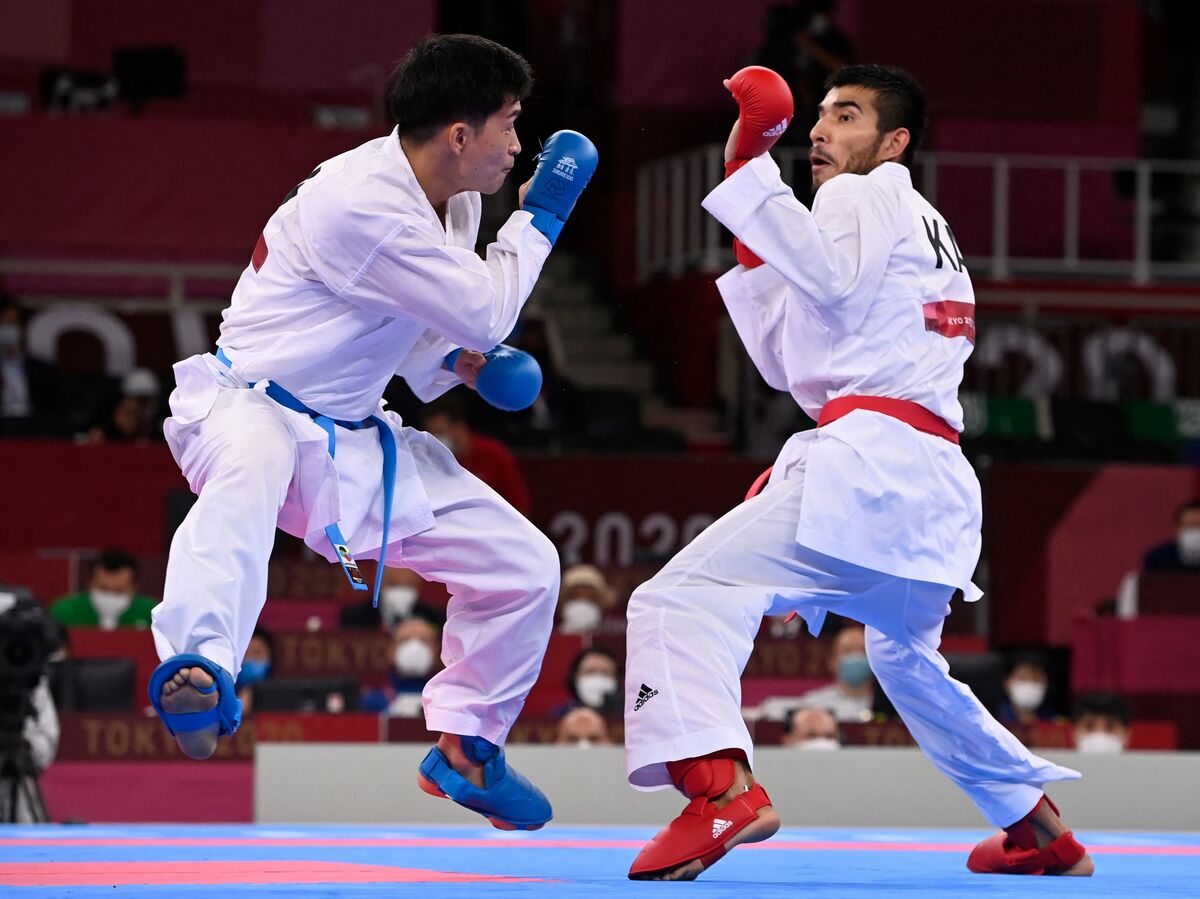
Japan’s Ryutaro Araga (L) competes against Kazakhstan’s Daniyar Yuldashev in the men’s kumite at the Tokyo 2021 Olympic Games. Bloop-bloop feet!
Alexander Nemenov/AFP via Getty Images
Modern Pentathlon
The big headline out of modern pentathlon this year was the coach who was thrown out for punching a horse. A little context: modern pentathlon includes swimming, fencing, riding, and then a combination of running and shooting. The horses for the riding portion are assigned to athletes in a random draw. And yes, the coach hit an uncooperative horse, but the real news should be sticking up for that horse’s autonomy and its right to decline to participate. What’s the lesson? Even in pursuits that you train and work at your whole life, there are elements you cannot expect to control. You can lead a horse to the Olympics, but you can’t … you know.
Rhythmic Gymnastics
Again, one that people love to make fun of, but if you can’t see that the precision in throwing a ball many feet in the air and catching it on the back of your neck isn’t all that different from the precision in shooting an arrow, you may be letting the glitter distract you.
Rowing
One of the challenges of being a rowing spectator, I find, is that the commentators don’t seem sure what to talk about, because if you can see the race, you basically know as much as they do. Rarely does a sport have such a short list of necessary updates. The first item is “who is ahead,” and there is no second item. But seen from another angle, this is an advantage. I just want to watch the boats go fast!
Rugby
I love watching rugby, because I know it’s wildly popular and the strongest vision I have of it is of Ross on Friends getting beat up by some of Emily’s associates. Rugby is tough. It is the best sport if only in the sense that it’s the one I believe would send me to the hospital the fastest.
Sailing
I began watching a sailing race early in my Olympic viewing, thinking, “I’m just going to watch this one sailing race, because I have to do some work today.” It took a while for me to realize this Olympic sailing race was going to take about two hours. Many sailing events are not really for those times when you are in a rush. They are contemplative. They are two hours long. Sailing is just like Christopher Cross always said: It takes me away to where I’ve always heard it could be. And by “it,” I mean “watching a sailing race for the rest of the day.”
Shooting
I must come clean: I am not a fan of sports that involve guns, simply because I am beyond finding guns entertaining in practically any context. But I’ll say this: If all the guns were for this purpose, we’d all be a lot better off.
Skateboarding
Skateboarding had such a delightfully unpretentious presence as a new sport at this particular Olympics; like snowboarding and BMX freestyle, it involves a certain amount of trying the hardest things you can, packing in as much content as you can, even if some tricks don’t work out. How can a sport where you wipe out and still excel not be the best sport? How is that not like life? You can’t do well in gymnastics if you step out of bounds. Imagine if you could fall off the balance beam and land on your front teeth and still get a good score.
Soccer
Soccer is the best sport according to perhaps the largest number of people around the world who might vote for best sport, so who am I to argue? Like Ted Lasso, I have issues with the rules about offsides, but working on those issues is a good opportunity to be a better citizen of the world.
Softball
People who think an underhand pitch won’t take your head off really aren’t thinking about the right thing when they hear the words “underhand pitch.”
Sport climbing
Another new entry this year, sport climbing is the best sport because it has a section where you work your way up a series of walls with various arrangements of [synthetic] boulders, and you figure each wall out after you see it, and they call the walls “problems,” and that has big math class energy.

Kyra Condie of Team USA works on a bouldering problem. Maja Hitij/Getty Images hide caption
toggle caption
Maja Hitij/Getty Images
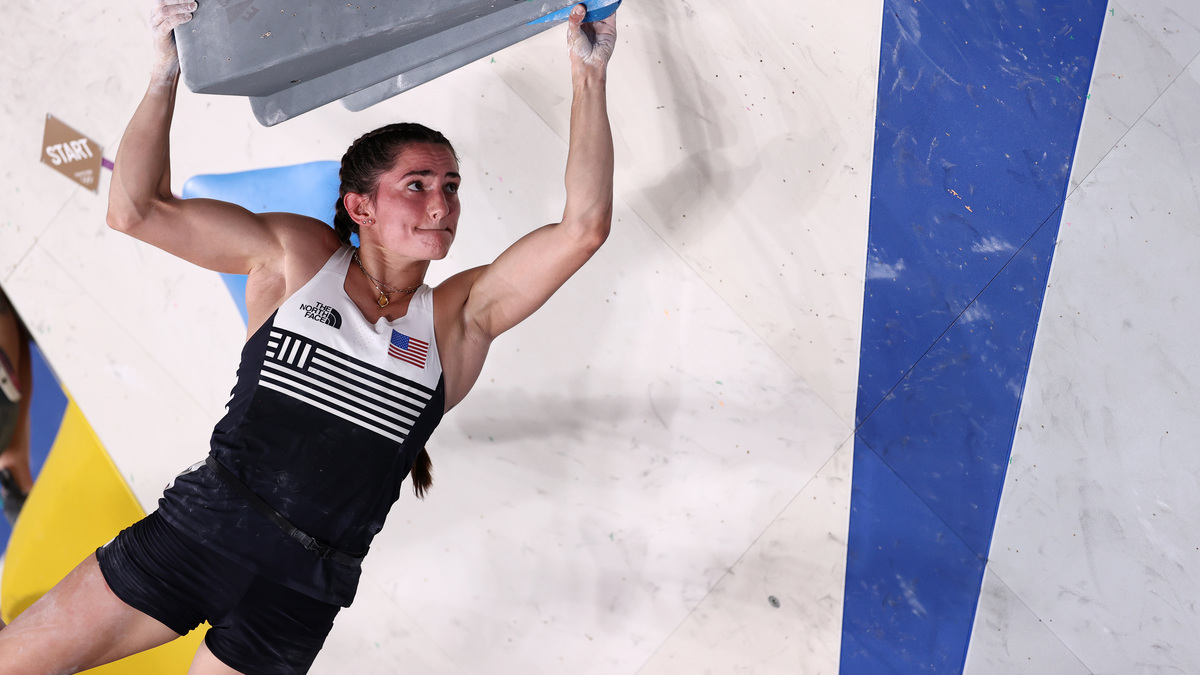
Kyra Condie of Team USA works on a bouldering problem.
Maja Hitij/Getty Images
Surfing
I have only watched one surfing competition in person: It was on the north shore of Oahu in (I believe) 2007, sponsored by Monster Energy (the drink, not the quality). One of my friends had won a sweepstakes and had a trip to watch from the Monster Energy hospitality house on the beach, and I got to tag along. Of all the things that are not me that I have ever done, watching surfing from the Monster Energy hospitality house might be the greatest among them, but let me tell you this: Surfing is very beautiful, and water is very temperamental, and when I watched competitive surfing this year, I thought, as I did back in 2007, “I think my strategy would be to bob up and down in an unassuming fashion and hope everyone forgot I was there and thought I was a buoy.”
Swimming
I think we all know that swimming is the best Olympic sport, and you know why? Because of the part at the end where they streeeeetch out their fingers to hit the pad at the finish, and sometimes somebody beats somebody else by a few hundredths of a second, and you really have to wonder whether cracking your knuckles before the race would have made a difference.
Table tennis
If I had to choose the athletes from one sport to give me pep talks every morning, I would choose the people who compete in table tennis. If you are asking why that is, I suspect you have not watched very much extremely competitive table tennis. It’s the most intense energy I’ve ever seen focused on a small flat area, other than when my dog tries to get a bite of my sandwich off the coffee table.
Taekwondo
At some point, all the fighting sports can begin to blend together, but taekwondo is a lot of fun to watch and is only held back from becoming wildly popular in the United States because people who don’t know a lot about taekwondo don’t realize that to a great degree, it’s kicking. Olympic kicking. It’s people kicking each other. Yyyyyyyyyeah! (Also, check out the story of taekwondo as a sport that has created medal opportunities for a lot of different countries.)
Track and field
I can’t possibly cover all the track and field events I watched, but there are some amazing disciplines I must mention. One is racewalking, and people talk about it looking silly every four years. I get it, and it does have a certain “well I never” quality on first glance. But if you watch it for about five minutes, it stops looking silly and just starts looking a lot like running, but with very purposeful hips and elbows.
Another is the throwing events, including the shot put and the discus, where the apparatuses are launched by way of a pirouette performed by what’s often a very mighty and sturdily built athlete. Between that pirouette, pure speed events, and the fact that I was up early enough this year to be watching live when two athletes from Italy and Qatar agreed to share a gold medal in the men’s high jump, I have no trouble arguing that track and field — or, as they also call it, “athletics” — is the best sport in the Olympics.
Trampoline
The thing that makes trampoline a great sport is that Olympic trampoliners (trampolinians? trampolympians?) bounce very, very high. How high? Thirty feet, they say. One guy got off-center, meaning he effectively fell from 30 feet in the air and put his leg right through the gap at the edge of the trampoline, and much to my endless shock, he didn’t snap at the pelvis like a popsicle stick. In fact, he seems to be fine. This kind of terrifying happening obviously is not what makes it a great sport, but the rarity with which it happens given the heights involved might be.

Japan’s Megu Uyama competes in the women’s final of the Trampoline Gymnastics event. It would take a very tall photo to show you where the trampoline is. Yuki Iwamura/AFP via Getty Images hide caption
toggle caption
Yuki Iwamura/AFP via Getty Images
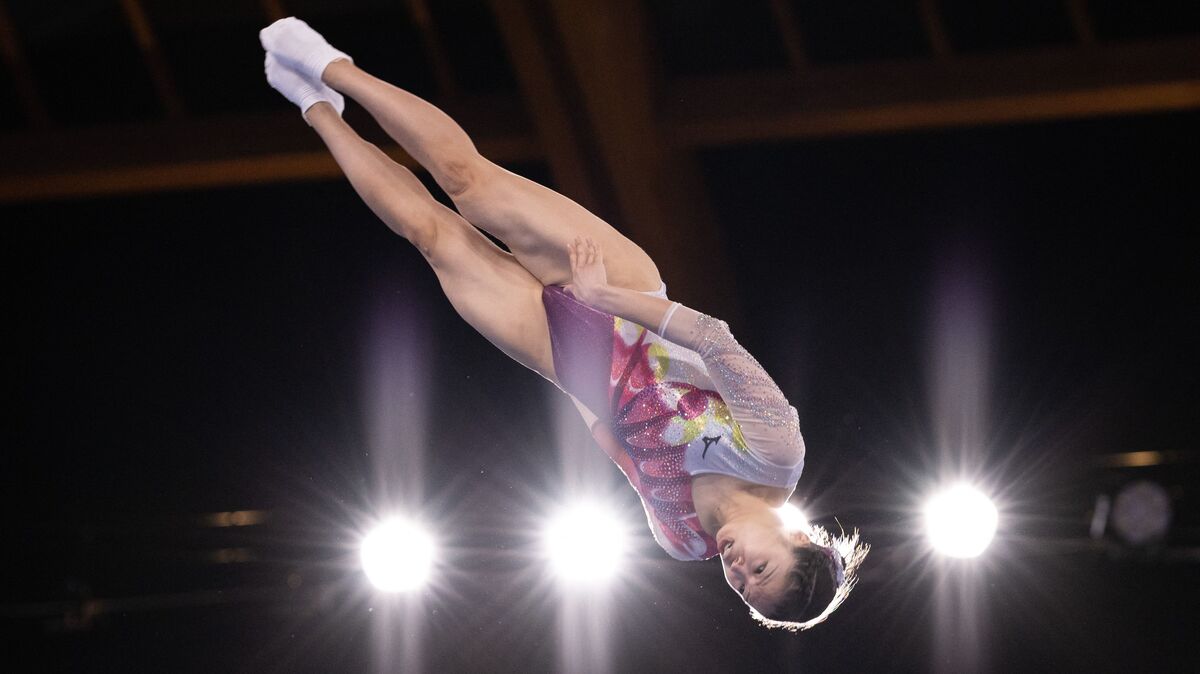
Japan’s Megu Uyama competes in the women’s final of the Trampoline Gymnastics event. It would take a very tall photo to show you where the trampoline is.
Yuki Iwamura/AFP via Getty Images
Triathlon
I think of triathlon people as solo dreamers, athletes who devote their entire beings to the most punishing pursuit they can think of. Thus, triathlon is the best sport because it is the one that sounds like the worst idea — unless you love doing it, in which case it is an all-consuming, beautiful idea. I do think there is something obviously missing, though, between the triathlon and the modern pentathlon. I would suggest the midcentury modern quadrathlon, which is made up of swimming, cycling, smoking, and picking out furniture.
Volleyball
This year’s USA women’s team won a gold medal after coming close for several Olympics in a row, and it was an absolute delight. Volleyball has theater in the form of fakes, drama in the form of arguing about what’s in and what’s out, research in the form of millions of people simultaneously Googling “why does one person on the team have a different shirt?”, and simple athletic power that actually brings very tall humans right up in each other’s faces. It’s good stuff.
Water polo
We should all be watching more water polo! Water polo is the best sport because everyone should be united in the firm belief that we should all be watching more water polo! It is hugely entertaining and faster than soccer or hockey, the Team USA women are a tremendous group that won a gold medal for the third time in a row, and everybody looks great in those caps. Why aren’t we all watching water polo right now? Bring me the year-round water polo league! Bring me the Ted Lasso of water polo!

Team USA goalkeeper Ashleigh Johnson celebrates a gold medal in water polo. You should probably be watching more water polo. Tom Pennington/Getty Images hide caption
toggle caption
Tom Pennington/Getty Images

Team USA goalkeeper Ashleigh Johnson celebrates a gold medal in water polo. You should probably be watching more water polo.
Tom Pennington/Getty Images
Weightlifting
There is only one thing I don’t like about weightlifting, and that’s my constant sense that some part of the athlete is going to collapse or fall off or bend the wrong way or explode. When I mentioned this on Twitter, someone told me that I definitely did not want to look up weightlifting injuries on YouTube, and that person is correct. I do not. Because I prefer to think of weightlifting the way I experience it as a spectator: as a series of emergencies (“a very heavy thing is over my head and I can’t hold it much longer”) that the athlete heroically resolves.
Wrestling
What’s more suspenseful than a sport where who’s winning is constantly shifting? For me, it’s a sport where I have no idea who’s winning at any given time. Now in fairness, yes, if one person is clearly cleaning the other person’s clock, I will be able to tell who’s winning. But I lack the background to know when someone is about to begin cleaning someone else’s clock, meaning that it always comes as a delightful surprise to me. Thus, wrestling, like every sport, is absolutely, positively, the best one.
from WordPress https://ift.tt/2VFbujl
via IFTTT

ไม่มีความคิดเห็น:
แสดงความคิดเห็น